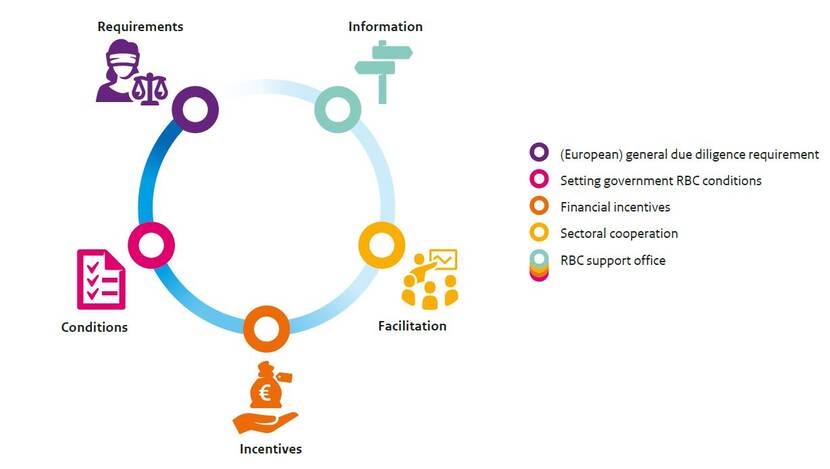Improving Responsible Business Conduct (RBC)
The Dutch government wants Dutch companies to engage in responsible business practices abroad. This means taking account of human rights, working conditions and the environment. That is what Responsible Business Conduct (RBC) is about. The government has 5 ways of encouraging RBC.
RBC rules and policy
The most important rules on RBC are set out in the OECD Guidelines for Multinational Enterprises on Responsible Business Conduct. These are recommendations made by countries that belong to the Organisation for Economic Co-operation and Development (OECD) or adhere to the OECD Guidelines. The Netherlands is also a member of the OECD.
The government expects all companies to follow these rules.
The government’s RBC policy encompasses the following 5 measures to promote responsible business conduct:
- Requiring businesses to practise RBC
- Setting RBC conditions
- Encouraging companies to follow RBC principles with grant incentives
- Facilitating sector-wide cooperation
- Providing information about RBC
More detailed information about RBC (in Dutch) is available on the website of the Netherlands Enterprise Agency (RVO.nl). The Netherlands Enterprise Agency (RVO) also has a support centre to help companies with questions regarding RBC.
1. Requiring businesses to practise RBC
The EU has reached a provisional agreement on a law making it mandatory for companies to practise responsible business conduct (in Dutch). This means that large companies in Europe have to consider what negative impacts they are having on people and planet, both at home and abroad. It also means they must address those negative impacts.
More specific laws and rules apply to certain companies, depending on how they work and what they make.
- The European Conflict Minerals Regulation (in Dutch) applies to companies that source certain metals and minerals from other countries.
- The Corporate Sustainability Reporting Directive requires businesses to report on what they are doing to take account of their impact on people and planet.
- The Forced Labour Regulation (in Dutch) is a law determining that products made with forced labour cannot be sold in the EU.
- The Regulation on Deforestation-free Products (in Dutch) is a law that puts strict limits on cutting down trees for the purpose of production.
- The Batteries Regulation (in Dutch) specifies that battery products have to meet certain rules, such as being made from recycled material.
You can find more information about the status of these laws (in Dutch) in the RVO RBC support centre.
2. Setting RBC conditions
The government encourages RBC, and sets conditions for companies wishing to do business with the government. For example, businesses that supply workwear to the government or join a trade mission. Suppliers are also required to submit RBC action plans and actively enter into discussions on the issue.
3. Encouraging companies to follow RBC principles with grant incentives
The government makes grants available to companies that want to address social risks such as child labour and low pay in their production chains. Companies can apply for a grant from the Social Sustainability Fund (in Dutch).
Companies only qualify for grants for doing business abroad if they can show that they comply with the OECD Guidelines.
4. Making sector cooperation easier
The government offers sectors the option of making agreements on RBC. The agreements concern the risks they wish to avoid regarding human rights, working conditions and the environment. Special agreements called RBC Agreements have been made previously for this purpose. The government is also developing a new form of sector-wide cooperation (in Dutch).
5. Providing information about RBC
The government supports business so they can do practise responsible business conduct. The RVO has a support centre to help companies with questions regarding RBC (in Dutch).
Companies can use the CSR Risk Check to see which RBC-related risks they could be exposed to. They can also use the OECD’s Due Diligence Guidance for help in making RBC policy.
Countries that adhere to the OECD Guidelines, including the Netherlands, have set up a National Contact Point (NCP). The NCP familiarises companies with the OECD Guidelines and how they can be applied. The NCP also deals with notifications from individuals, civil society organisations and enterprises that have a difference of opinion concerning the application of the Guidelines.
